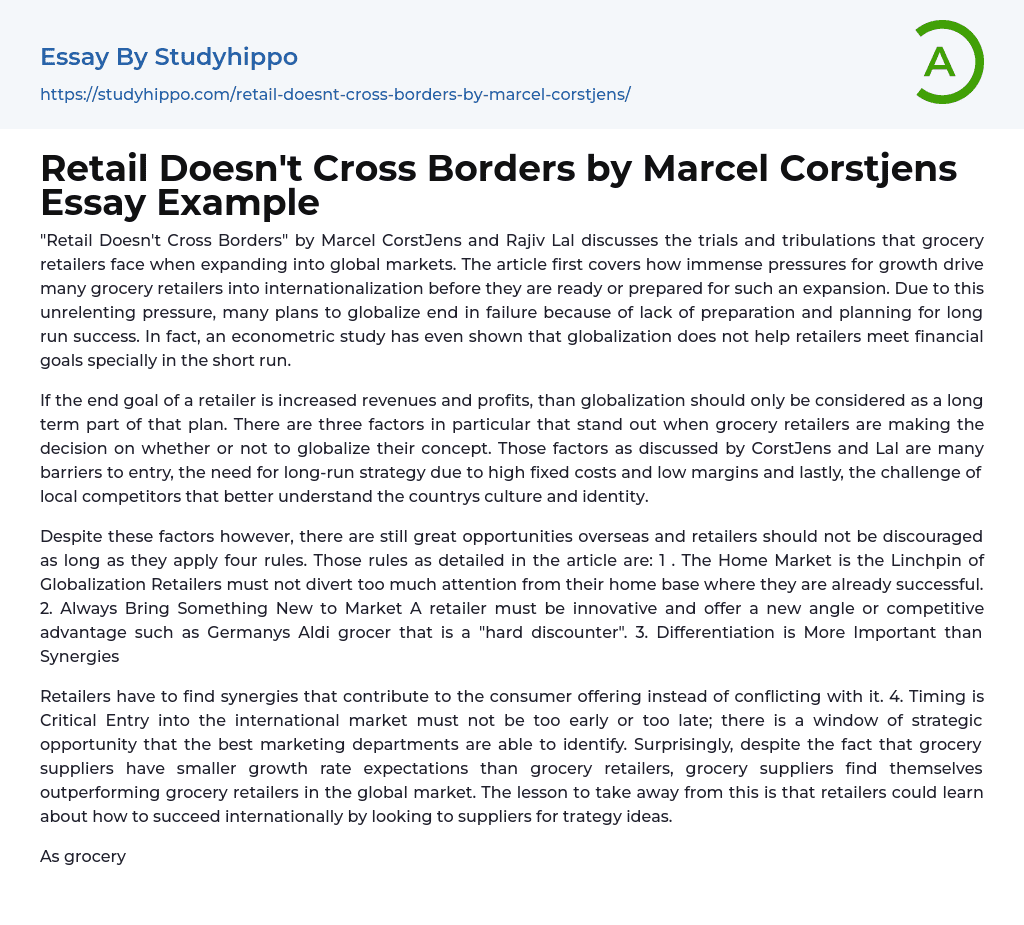

Retail Doesn’t Cross Borders by Marcel Corstjens Essay Example
The article "Retail Doesn't Cross Borders" by Marcel CorstJens and Rajiv Lal examines the challenges that grocery retailers encounter when they enter global markets. The authors highlight how the desire for growth often leads these retailers to expand internationally without proper readiness or preparation. As a result, many attempts at globalization fail due to insufficient planning and a lack of long-term success strategies. Interestingly, an econometric study has demonstrated that globalization does not assist retailers in achieving their financial objectives, particularly in the short term.
CorstJens and Lal highlight that retailers should perceive global expansion as a long-term strategy for enhancing revenues and profits. They stress the significance of three factors in determining whether to internationalize grocery retail concepts: barriers to entry, the necessity of a long-term approach due to high fixed costs and low profit
...margins, and competition from local rivals who possess a more profound understanding of the country's culture and identity.
Despite the aforementioned factors, there are still significant international opportunities available for retailers. It is important not to be discouraged as long as four specific rules are followed. These rules, outlined in the article, include: 1. The home market plays a crucial role in globalization, so retailers should not stray too far from their established success. 2. Introducing new and innovative aspects to the market constantly is imperative. For example, Aldi, a German grocery store, is renowned for its "hard discounting" approach. 3. Placing emphasis on differentiation holds more significance than seeking synergies.
Retailers should aim to find synergies that enhance the consumer offering instead of creating conflicts. Timing plays a crucial role in international market entry, as retailers need
to identify the strategic window of opportunity. Interestingly, grocery suppliers are outperforming grocery retailers in the global market, even though they have lower growth rate expectations. This suggests that retailers can learn valuable strategy ideas from suppliers on how to succeed internationally.
While struggling to attain global success, it is crucial for grocery retailers to focus on expanding their domestic markets by growing their current formats, venturing into new formats, and capitalizing on their brand. Several ideas from CorstJens' and Lal's article correlate with the subjects discussed in Chapter 13: Global Marketing of "A Preface to Marketing Management" by J. Paul Peter and James H. Donnelly, Jr. This chapter explores Michael Porter's diamond of national advantage, which emphasizes four factors that determine the probability of related and supporting industries, as well as company strategy, structure, and rivalry.
The article provides an excellent example of how Wal-Mart's failure in Germany can be connected to their different people policy compared to the high-wage German labor force. The text also discusses factors that are conducive to global strategy, including market factors and the importance of homogeneity in market needs. The article points out that one of the biggest challenges for grocery retailers expanding globally is the heterogeneity of local tastes and its impact on global supply chain management.
The article emphasizes the significance of long-term planning for achieving long-term success. It further discusses the various aspects involved in global marketing such as research, product strategy, distribution strategy, pricing strategy, and advertising strategy. The text highlights that an effective globalization project requires attention to all these components and warns that retailers who rush the process are likely to fail.
align="justify">According to CorstJens and Lal, due to the constant pressure for growth, many globalization strategies are opportunistic and risk undermining carefully planned long-term strategies. The global economy today is highly competitive, and every corner of the world experiences pressure to grow and generate wealth for shareholders. Given this difficult environment, grocery retailers cannot afford to overlook the potential for global expansion. Choosing not to expand globally could ultimately be a fatal decision for an organization, as their competitors take advantage of the strategic opportunity for globalization and surpass them in the market.
The article discusses how Target and Kroger, two major retailers, may have missed the chance to seek growth opportunities in foreign markets. Advances in technology have made it easier to communicate across countries, slightly reducing barriers to entering international markets. However, even with increased global connectivity, people are now more determined than ever to preserve their cultural identities and values, resisting the potential loss caused by globalization.
- Auction essays
- Balanced Scorecard essays
- Business Plans essays
- Expense essays
- Income essays
- Net Income essays
- Security Guard essays
- Singapore Airlines essays
- Battle essays
- Intranet essays
- Maintenance essays
- Simulation essays
- Inn essays
- Chief Executive Officer essays
- Convenience Store essays
- Firm essays
- Training And Development essays
- Unilever essays
- Variable Cost essays
- Virgin Group essays
- Bargaining essays
- Entity essays
- Pest analysis essays
- Business Law essays
- Contract essays
- Consumer Protection essays
- Property essays
- Ownership essays
- Agreement essays
- Common Law essays
- Contract Law essays
- Justice essays
- Security essays
- Tort Law essays
- United States Constitution essays
- Crime essays
- Lawsuit essays
- Treaty essays
- Family Law essays
- Marijuana Legalization essays
- Constitution essays
- War on Drugs essays
- Court essays
- Jury essays
- Police essays
- Protection essays
- Community Policing essays
- Criminal Law essays
- Judge essays
- Lawyer essays


Unfortunately copying the content is not possible
Tell us your email address and we’ll send this sample there.
By continuing, you agree to our Terms and Conditions.

